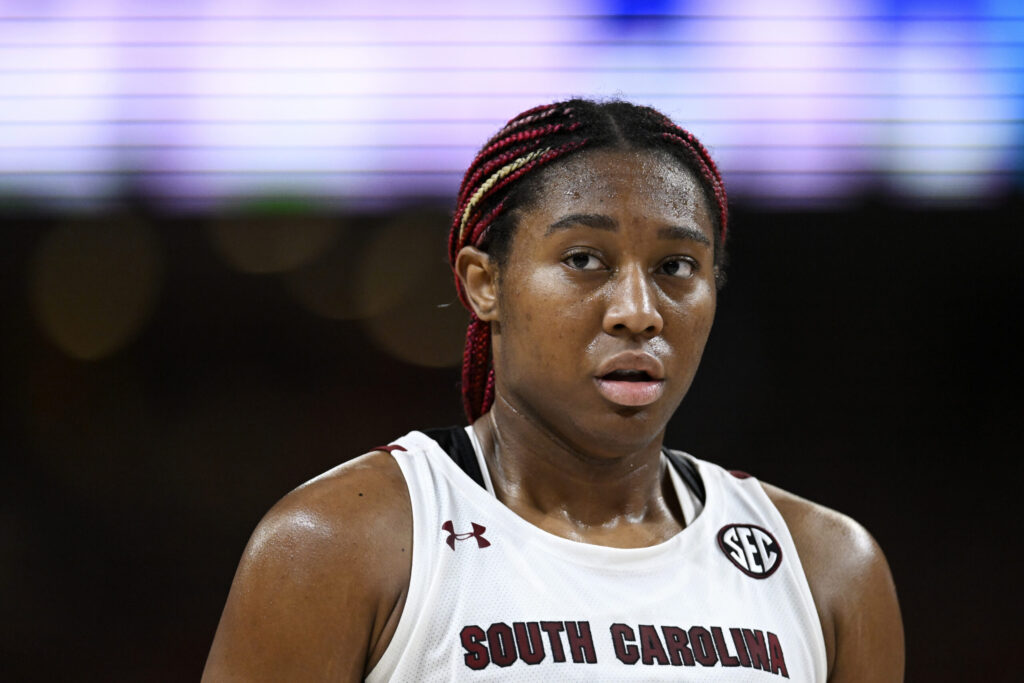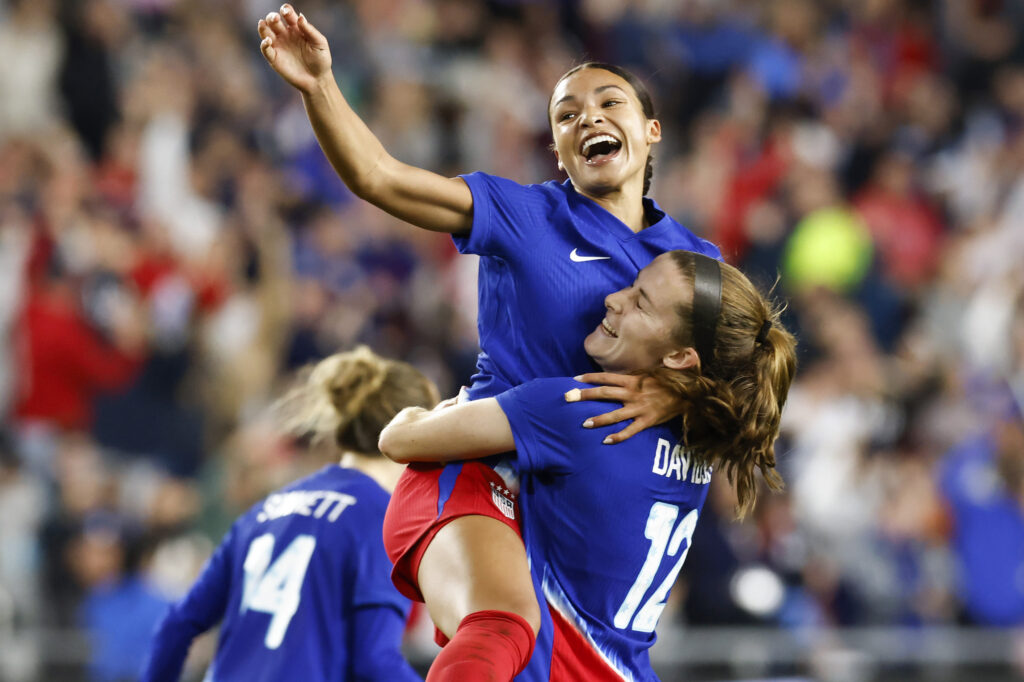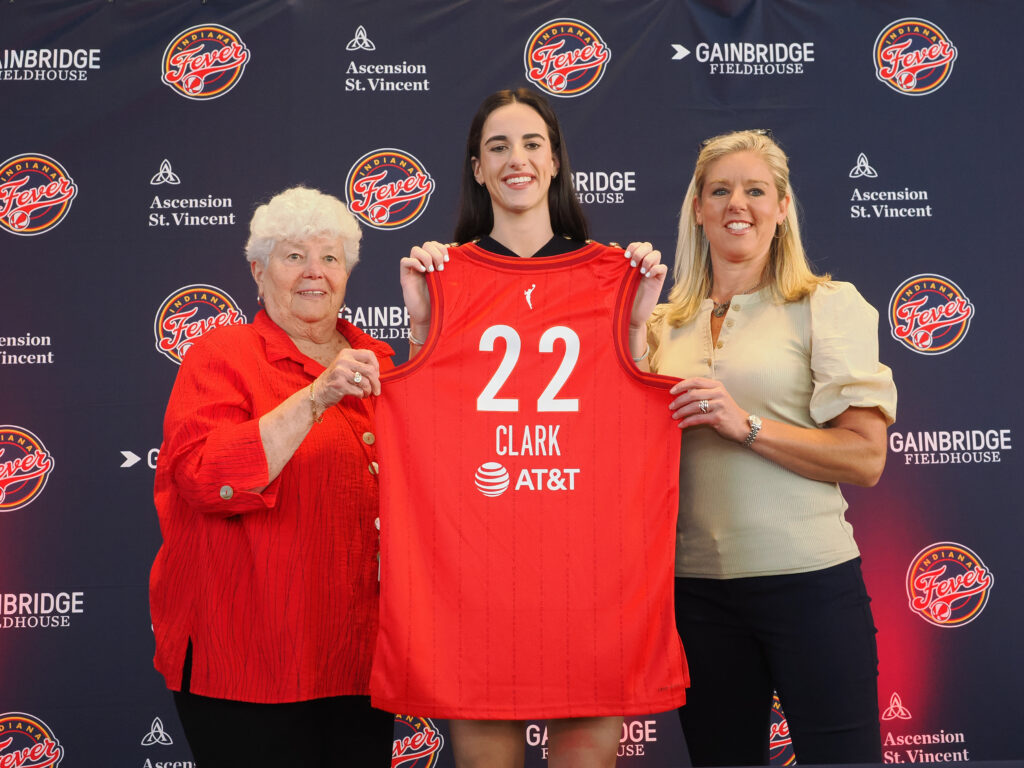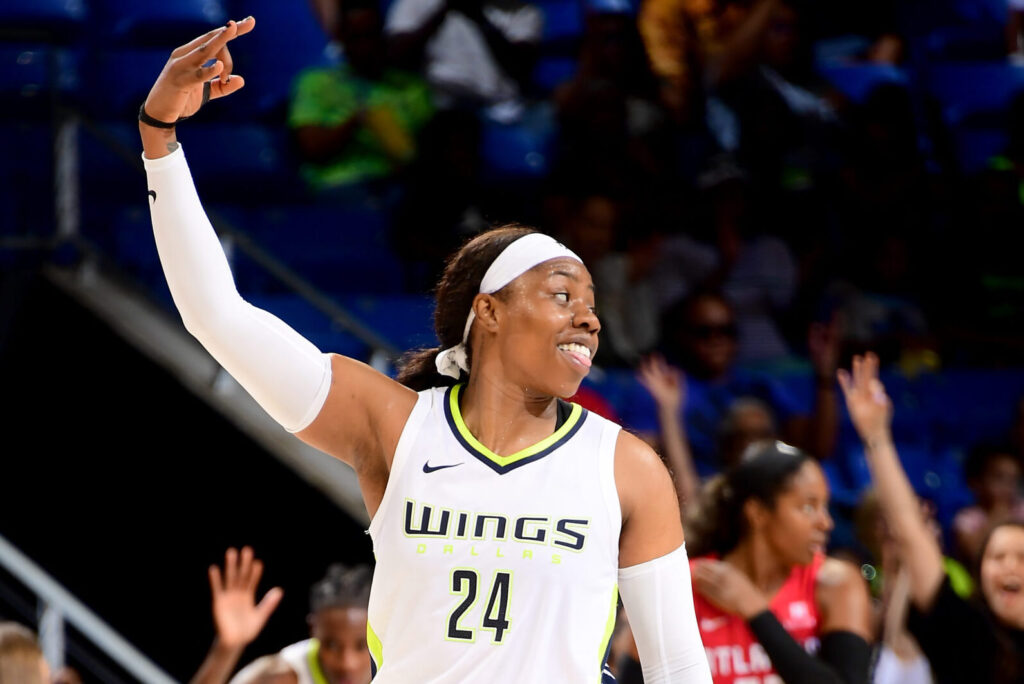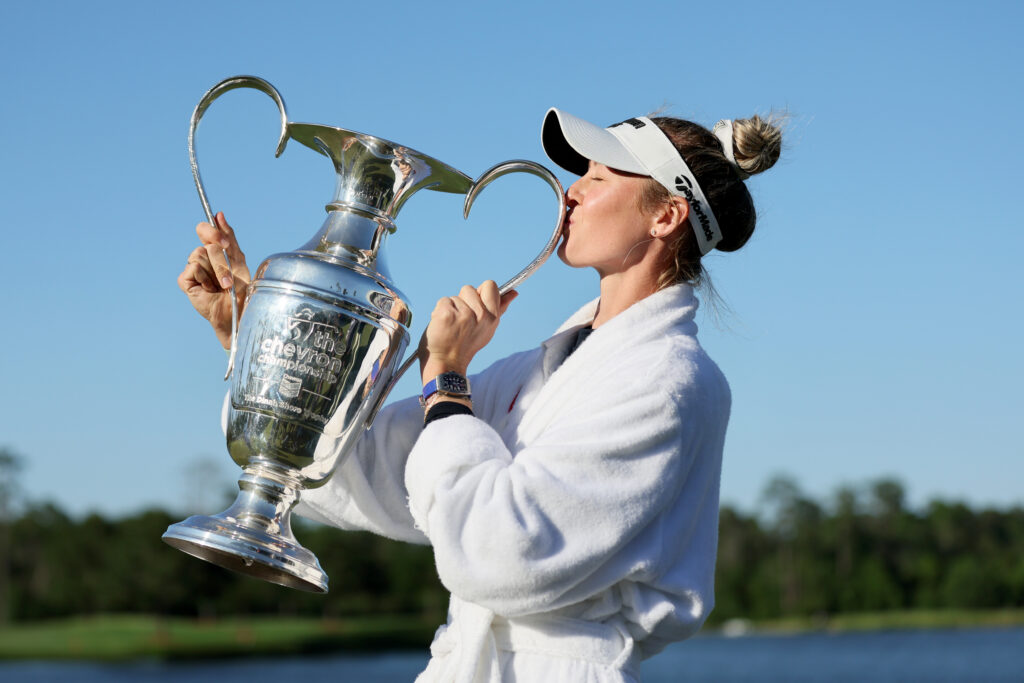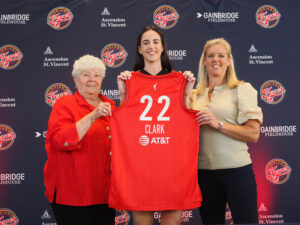If you had a TV, a phone or a computer in April 2021, you saw it.
Aliyah Boston certainly did. She lived it, and then she watched as it was played over and over and over again.
Thirty-nine minutes and 59 seconds of basketball had been played before Boston’s putback in the 2021 Final Four against Stanford bounced off the rim, but that moment, one that took place in less than a second, became the defining moment of her season. Never mind that the sophomore averaged 13.7 points, 11.5 rebounds, 2.6 blocks, 1.6 assists and 1.2 steals per game. Never mind that she led her team to a 26-5 record and the Final Four.
The moment was taken and twisted into a narrative that said: “This is Aliyah Boston.”
South Carolina was THIS close to winning the game on a buzzer beater 🤯 pic.twitter.com/n9jCk2OHxx
— Bleacher Report (@BleacherReport) April 3, 2021
And it only went away because she forced it to. Boston had to win Player of the Year, Defensive Player of the Year and a national championship in 2022 for the narrative to shift. But the fixation on certain moments still hasn’t gone away. This season, it’s her stat line. Never mind who she’s playing with. Never mind the undefeated record. Never mind the fact that South Carolina is the favorite to win the title once more. Now, it’s a string of numbers slapped next to her name that show a dip from last season. They are taken to say: “This is Aliyah Boston.”
But the problem with reducing someone to a single moment is that you miss out on the details.
As the shot was replayed on TV and reposted on social media, Aliyah got lost. In the constant discussions of stats and skills and awards, Aliyah once again gets lost.
And there is so much more to her.
There was then, and there is now.
No single play — good or bad — can define her.
The shot and the stats, like every moment of her career, are part of her story, but they’re not the story.
She is.
***
There are only two things in Boston’s life that get her up before the sun: God and basketball.
Growing up in St. Thomas on the Virgin Islands, Boston practiced on outdoor courts. In order to avoid the heat, she and sister Alexis would get up in the dark and at 6 a.m. would head to the court, where they would practice until 8. The girls were happy to do it, but sometimes it took their mom Cleone’s coaxing to get them out of bed.
“It was tiring. We were, like, 9 and 10 years old. Like, are you kidding me?” Aliyah says with a laugh. “But it was fun.”
When they got home, their dad Al would make breakfast, usually eggs, bread and sausages. “He makes them so good,” Aliyah says.
And finally, with new basketball skills and full bellies, the girls would go back to bed.
The routine changed once a week because Sunday School was the priority, so the girls would go before they started practice. Cleone and Al grew up with God in their hearts, and they wanted the same for their daughters. That relationship, Cleone says, is the most important one a person can have.
So even when Aliyah and Alexis left St. Thomas and moved to Worcester, Mass. to live with their aunt, religion remained at the center of their lives. Things were changing for the girls, but that would not. They tried to do family devotions together, over the phone in the evenings, but sometimes schedules wouldn’t align. When that happened, the girls, then 12 and 13, would get up at 5 a.m.
“That was not always so uplifting for them,” Cleone laughs. “But we needed them to know that that is the foundation. Whatever you want to do in life is not possible without Him.”
When the girls were little, they had no choice in the matter. Like most kids, their parents made all the decisions. But they had to grow up quickly in Worcester. They still had family supervision, but their parents had less say in their daily lives. Even then, they chose to continue the religious foundation Al and Cleone instilled in them, and today, when Aliyah credits God in her interviews, it makes Cleone’s heart swell with joy.
But it wasn’t all warm and fuzzy. The move was hard on everyone, and the Bostons made it work the best they could by talking on the phone — not just texting — every day. Even now, Aliyah loves to FaceTime. Seeing the people in her life is just as important to her as hearing their voices.
If Al or Cleone missed their daughters too much, they knew Aliyah and Alexis were just a plane ride — or two or three, depending on the amount of connecting flights — away.
“We always had space on our credit card for at least one flight,” Cleone says.
These days, Aliyah treasures her own visits to St. Thomas. No matter how comfortable she got in Massachusetts, or how much she loves South Carolina, St. Thomas is always home. After her parents and her dad’s cooking, the thing she misses the most is the water.
“I’m a beach girl,” she says.
By the time Aliyah made the move to Massachusetts, she was already a bonafide star. The Bostons never dreamed Aliyah would be winning national awards and championships, or signing NIL deals with companies like Crocs and Orangetheory. To them, the dream was always to use basketball as a way to earn a college scholarship.
The move helped with that.
Once Aliyah started playing AAU, Cleone would call her and ask who she was playing. Every time, Aliyah had the same answer: “I don’t know.”
To her, the name of the opponents didn’t matter. Aliyah was just playing basketball, and if she played the way she knew how, the way she always did, she would be successful. It wasn’t that she was cocky — Cleone wants that to be clear. Her daughter just had an inherent self-belief that she could do anything.
During one of those games where Aliyah didn’t know her opponent, Cleone had flown in to watch. As they walked into the gym, Aliyah realized she’d left her jersey in the car and ran back out to the parking lot to retrieve it. As she sprinted away, her mom heard the chatter in the gym: “That’s her. That’s the girl!”
“When she came back I said, ‘You may not know who you are playing, but guess what? Those girls know who the hell you are,’” Cleone says now with a laugh.
***
Aliyah has always cared deeply and desperately for the people around her. Even those she doesn’t know.
“You can never say Aliyah has been nasty to someone,” says Stanford player and close friend Haley Jones. “She’s always everyone’s biggest fan.”
During games, she likes to “chop it up” with opponents. You won’t find her trash-talking, unless it’s lighthearted banter with one of her friends on an opposing team. Instead, she typically makes conversation.
“She is chatting, especially when we play against each other. Our teammates will be like, ‘Will y’all shut up?” Jones says with a laugh.
Aliyah is the kind of person to seek opponents out after a game. If they played well, it’s to congratulate them. If they didn’t, she offers encouragement. And on her own squad, Aliyah always puts her teammates first. She knows every player’s in-game assignment as well as she knows her own. She knows how her teammates are feeling, and what they are going through.
Mistakes are her responsibility. Losses are her responsibility. Even when they shouldn’t be.
“If things aren’t going well or if the team loses, she takes that on,” Cleone says.

When South Carolina played one of its closest games of the season, a 64-57 overtime win over Ole Miss on Feb. 19, Aliyah finished with a double-double. Her 13 points, 12 rebounds and three assists were a big reason the Gamecocks came away with a victory. But as the last minute of regulation ticked down, she missed three free throws in a row.
The first thing Aliyah did when she got off the court was type a message in her family group chat: “Sorry I missed those free throws,” she wrote.
Never mind that she made the one that counted, forcing overtime and allowing her team to win in the extra frame. The mistakes were the first thing she held onto, because of what they could have caused.
For Aliyah, the idea of letting her people down, even if it’s just based on her own perception, is almost too much to bear.
Cleone tells a story about Aliyah and Alexis, back when the girls were in first and second grade, living in St. Thomas. She took them to the park, and Alexis, the older sister, had lent her bike to a little boy who didn’t have one. Cleone sat on a bench with the other parents and watched. Alexis became unhappy seeing the boy playing with her bike. Finally, she decided she wanted it back, but she didn’t want to ask for it. Alexis felt bad, but Aliyah didn’t. Her sister wanted her bike, so she would get it.
“I went over and got it,” Aliyah says. “I could have just minded my business, but I didn’t because she wanted her bike back.”
But if the boy was playing with Aliyah’s bike, they know it would have been different.
“I probably would have just let him have it,” she says.
***
Aliyah fell into a crouch. She planted her palms to the floor and let her head drop, her blue and yellow braids cascading down around her face.
South Carolina had just lost to Stanford in the 2021 Final Four, and Aliyah had missed the final shot attempt, one that would have lifted the Gamecocks to a one-point victory at the buzzer. Instead, they fell 66-65 and would be going home.
As cameras zoomed in on her crying, they captured a moment that would dominate headlines, photos and tweets surrounding the game. But they missed the truth.
Aliyah wasn’t crying because she missed the shot. She was crying because her team lost. And she knew how hurt they would all be.


Like the text to her family after the Ole Miss game, and like her quest to reclaim her sister’s bike, she was never the motivation. They were.
That is why she cried. Not for her, but for them. Aliyah took it all on.
Jones was on the other side of the shot. She celebrated the win with Stanford as Aliyah and South Carolina were in agony over defeat.
“Forty minutes happened before that shot,” Jones says, shaking her head. Nearly two years later, she’s still visibly irritated about what her friend went through.
Aliyah finished with 11 points, 16 rebounds and four blocks. South Carolina missed 42 other shots, but Aliyah’s was all anyone could talk about. Everywhere they looked, Al and Cleone saw their daughter’s crying face.
“I’d never seen anything run on TV so much,” Cleone says. “I told my husband, ‘Her tears are going to be famous.’”
***
After that, Aliyah and coach Dawn Staley made a pact. They would “turn her frown upside down.” Aliyah would have a season so exceedingly dominant that every media outlet in the country would have no choice but to replace the photo of her crying with one of her beaming with joy.
And she did.
Aliyah won 2021-22 Player of the Year and Defensive Player of the Year. Then, she led South Carolina to a national title, the second in program history.
The narrative shifted because she forced it to. But as quickly as those tears became smiles, the praise became criticism once more.
This season, it’s Aliyah’s stat line that’s being brandished against her — 13.3 points, 9.7 rebounds, 2.0 blocks and 1.8 assists per game. Those numbers are lower than her production last season, and are compared to the season averages of players like Caitlin Clark of Iowa (27 points, 8.3 assists, 7.5 rebounds) and Angel Reese of LSU (23.4 points, 15.5 rebounds).
“If you put things into context, Aliyah is playing with other All-Americans on her team,” Jones says. “She doesn’t have to carry her team, but put her in a scenario that she needs to, and best believe she will.”
Look at any social media post about Player of the Year candidates this season, and you’ll notice a theme. Most players have defenders in the comments, pleading their cases. Aliyah has those, too, but she also has critics. They make sure to lay out all the reasons that she shouldn’t win. There are so many that it’s impossible to miss, such as in a March 4 tweet about the Wooden Award finalists:
“Typical ESPN bias promoting Boston over everyone else.”
“Aliyah Boston is the most overrated player in all of sports. Her numbers are average. She wins awards because of her team/ coach.”
“Undeserving. Enough said.”
Aliyah is aware of these kinds of comments. Especially when the Twitter trolls go out of their way to tag her, ensuring that Aliyah sees their hate.
And sometimes, she wants to respond. Just for a moment, she thinks, she might control the narrative once more.
But she never does.
“Not every battle is for me to fight,” she says. “I learned that in the past, especially last year. I just have to live the truth of what is for me is for me.”
That doesn’t mean she isn’t tempted. But when she is, Cleone is there to remind her to leave it alone.
“People will bait you,” Cleone says. “People put things out there just to get you involved. And sometimes the best way to argue with a fool is to say nothing at all.”
And if the comments are bad enough that they need a response, there’s always someone to stick up for Aliyah so she doesn’t have to stick up for herself: Dawn Staley.
South Carolina’s head coach is Aliyah’s fiercest protector. There’s no battle she won’t fight for her senior.
When the crying photo was being posted over and over, Staley tweeted several pictures of Aliyah for media outlets to use as replacements.
When Aliyah wasn’t invited to the ESPYs last year, despite being nominated for an award, Staley spoke out.
And now, when people criticize Aliyah’s numbers, Staley has more words.
“There’s not anyone in the country that produces like she produces on both sides of the basketball,” she told reporters after South Carolina beat then-No. 3 LSU in February. “Nobody. She is the best player in the country.”

The shot didn’t change Aliyah, and the constant conversation around her stat line won’t either. She’s always been steadfastly herself, from the braids to the colorful crocs she wears.
South Carolina and Staley changed her, though. For the better.
Aliyah came in as a shy freshman, and by her sophomore year she had been named a team captain. Her coaches asked her to be more of a leader, so she worked at it every day. Coming to South Carolina, Aliyah says, is the best thing she ever did. Her teammates, Staley and the program have made Aliyah even more herself.
“She never had to dress like someone else or have what someone else had to be comfortable,” Cleone says. “She was always comfortable in who she is. And that has never changed. But she has grown and she has gotten even more confident in who she is as a person.”
Despite Cleone’s insistence that Aliyah not respond to hate, she does. Just in her own way, one that Cleone can be proud of.
Every day that Aliyah holds her head high is a response. Every game where she succeeds, and even ones where she struggles, Aliyah is responding. She’s responding by being herself, by living life her own way. It’s allowed her to wade through criticism and become a fixture in the game. Aliyah is projected as the No. 1 pick in the 2023 WNBA draft. When you think of women’s college basketball, it’s hard not to think of the South Carolina star.
But like turning the frown upside down, Aliyah had to make that happen. She had to be so good that she could not be ignored.
Last season, in addition to her POY and DPOY awards, Aliyah was named SEC Player of the Year, SEC Defensive Player of the Year, the Wade Trophy winner, the Associated Press Player of the Year, the Lisa Leslie Award winner, the Final Four Most Outstanding Player and a national champion.
She became the face of the sport.
And yet, with every award, every record, every great game, there are prominent voices trying to knock her back down.
“They can always find a positive when it’s someone else, even if they have a bad game,” Cleone says. “But for Aliyah it’s, ‘Oh, Boston doesn’t perform anymore. They won, but she was nowhere to be found.’”
Aliyah is careful when addressing this point. She knows it’s easy for people to take her words and twist them.
But she also knows the realities of being a Black woman in the spotlight. And when it comes to her representing women’s college basketball, there are critics who would rather see someone else.
It’s a topic Staley discussed on her podcast NETLIFE during last year’s Player of the Year race, stating that the way Aliyah is portrayed in the media is “different” than the way other predominant players are covered.
“In terms of me being a Black woman, it’s not always what they want to put out,” Aliyah says. “It’s definitely hard in that matter because sometimes people have this specific image that they would rather see.”
Aliyah has learned that she can’t please everyone. She can’t be everything to everyone. There will always be people who don’t want her to succeed, and it’s hard to ignore them, but Aliyah knows those people don’t matter.
“You don’t have to be perfect for the people outside of your circle,” she says.
***
Cleone and Al may live far away, but they come to as many games as possible. Recently, they made the long journey from St. Thomas and settled into the stands for one of Aliyah’s games. They prepared to cheer for their daughter, only to hear opposing fans calling Aliyah and her teammates “thugs” and spewing other hateful rhetoric, unaware that her parents were sitting right next to them.
Aliyah responded, just like she always does — without saying anything. The senior posted up her opponent and executed a strong move, scoring with ease.
Cleone stood up.
“That one is mine!” she exclaimed with pride, loud enough for the whole section to hear.

Aliyah’s circle will continue to support her, and others will continue to criticize. Through it all, Aliyah will continue to be Aliyah. She will keep wearing her hair in colorful braids. She will keep loving God. She will keep dominating on the basketball court, winning games and awards. She will keep uplifting those around her.
She will keep finding the joy in basketball, no matter what moments people choose to define her by.
They will talk about the shot, and the stats, and whatever else they can use to try to bring her down. But if you want to pick a moment that says, “This is Aliyah Boston,” plenty of others would be more apt.
Define her as the little sister who got her sibling’s bike back.
Define her as the daughter who talks to her parents on the phone every day.
Define her as the player who puts her teammates first, and the one who wants everyone to find success in life.
But however you define Aliyah Boston, remember this:
“The world cannot break my child,” Cleone says.
Aliyah is too strong to be broken. She shouldn’t have to be, but she is.
Eden Laase is a Staff Writer at Just Women’s Sports. Follow her on Twitter @eden_laase.
